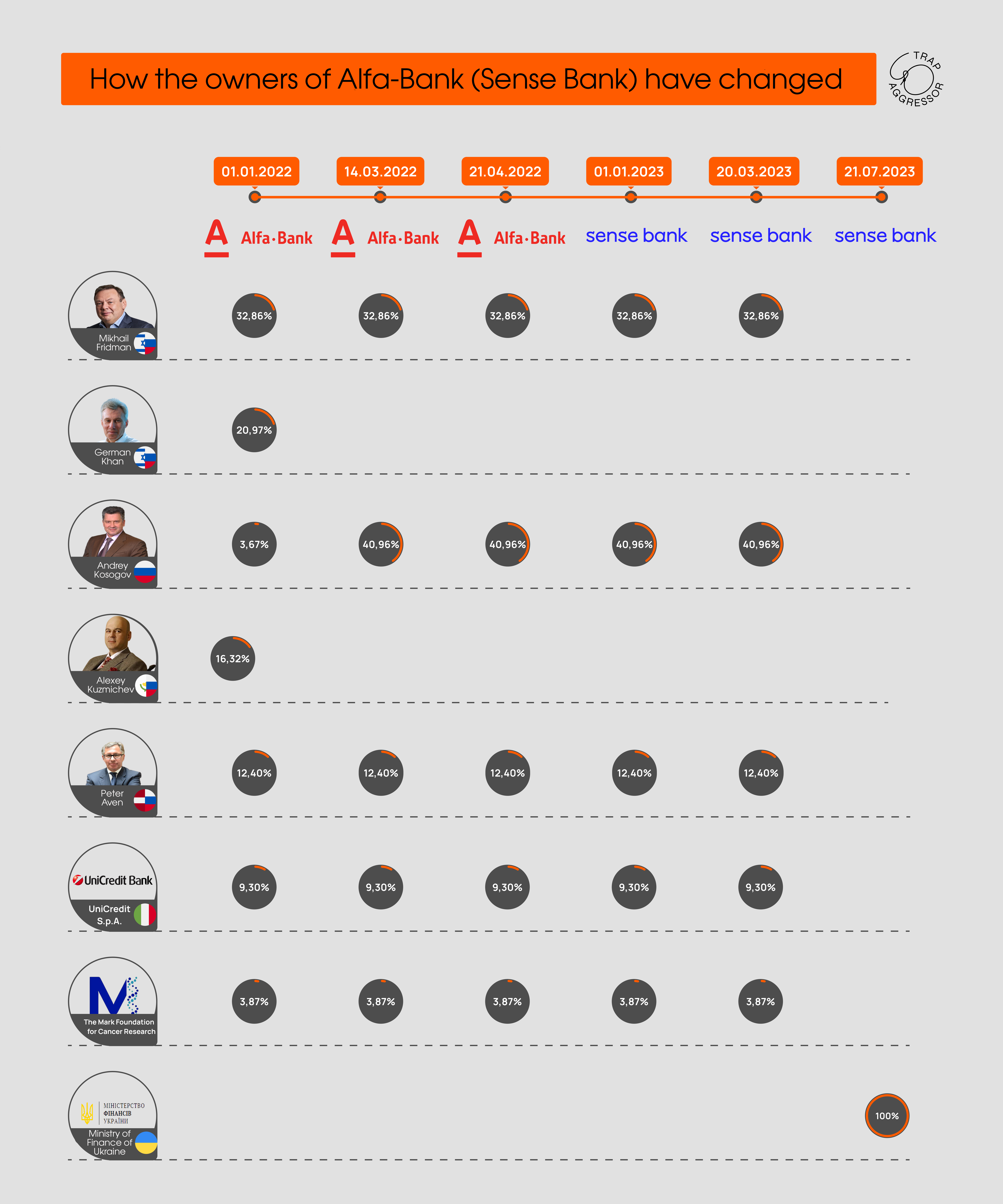SENSITIVE defeat of the Russian "Alfa Group Consortium
The nationalization of the last Russian bank in Ukraine took place almost imperceptibly for its customers. However, for its former owners, it seems that all the fun is just beginning.
On Monday, July 24, it became known that the Security Service of Ukraine (SBU) is investigating attempts by the Russian ex-owners of one of the largest Ukrainian banks to circumvent the sanctions of the National Security and Defense Council of Ukraine (NSDC) and Western partners. The financial institution was not named in the release, but, according to our information, it is about "Sense Bank" (formerly "Alfa-Bank "). According to the investigation, after the full-scale invasion of the Russian Federation, the former co-owners of the bank, fearing the application of sanctions against them, looked for ways to illegally withdraw assets. In order to obtain profits, it was planned to transfer the oligarchs' shares to controlled persons. And in the future, on behalf of the nominal "new" beneficiaries, billions of capital will be "transferred" to Putin's oligarchs, who are the real owners of the financial institution. According to the investigation, the last chord of the scheme of the Russians was to hide traces of the embezzlement by bringing the bank to bankruptcy. It's not that the state had few reasons for nationalizing the bank before that, it's just that now they have increased.
During searches of the addresses of the bank's head office and residences of top management, means of communication and media with evidence of illegal activities of its former Russian owners were found. The special service also noted that this business actively cooperated with armed formations of Russian origin fighting in Ukraine. In fact, that is why criminal proceedings are opened under Part 3 of Article 110-2 of the Criminal Code of Ukraine (financing of actions committed with the aim of violent change or overthrow of the constitutional order or seizure of state power, change of territorial boundaries or state border of Ukraine).
If earlier the banking community was rather preparing for lawsuits from former owners to the state regarding the illegality of nationalization (following the example of Ihor Kolomoiskyi and Gennadiy Bogolyubov, who still cannot "say goodbye" to PrivatBank), now the judicial continuation of the story may follow a completely different scenario. At first glance, the decisions made by the bank's owners, namely Putin's oligarchs Mikhail Fridman, Petro Aven and Andrey Kosogov, were intended to keep this bank to themselves, but now they can be interpreted in a completely different way.
Let us recall that in 2016 the holding company of "Alfa Group Consortium" – ABH Holdings S.A., which indirectly owns 100% of the shares of Alfa-Bank (Kyiv), signed an agreement with UniCredit Group on the sale of 100% of the shares of PJSC "Ukrsotsbank". This holding company made this decision in exchange for a minority ownership stake of 9.9% in ABHH. We will not detail all the terms of the sale, but we will explain the importance of such an M&A agreement. In those years, the banking sector had about 120 active financial institutions. As of October 1, 2015, in terms of assets, Ukrsotsbank ranked 7th (43 billion UAH), "Alfa-Bank" ranked 8th (41.9 billion UAH). Therefore, such a merger in terms of assets brought this "project" to the fourth place among all banks, after the state-owned Ukreximbank, Oschadbank, and then still non-state-owned PrivatBank.
It should be remembered that at that time the banking sector was being actively cleaned, about half of almost 200 financial institutions were recognized as redundant and unnecessary, so many of them were liquidated, and the requirements for banks became stricter. And the increased number of assets and especially the number of retail customers is no guarantee in the new conditions.
After the full-scale invasion, it became clear that all Russian assets in Ukraine, the owners of which are in one way or another related to the Putin regime, would be confiscated. Therefore, it is natural that "Alfa-Bank" was subject to similar procedures. However, it was impossible to simply liquidate it, like other Russian banks, because even then it was a bank with three million individual clients, so any troubles in its work would have a negative impact on the entire banking sector. Thus, apart from nationalization, there were no other ways. But nationalization requires grounds: either there must be a lack of capital or liquidity. And taking into account that during the war, the National Bank of Ukraine (NBU) did not require banks to comply with "capital" standards, only liquidity remained, with which the bank was in a more or less normal and stable situation. However... representatives of the National Bank of Ukraine (NBU) understood from the very beginning that in the event of the need for recapitalization of the bank, the beneficiary under sanctions would not be able to do so, even if that person had such a desire. That even without taking into account the prospects of withdrawing assets from the bank and its artificial bankruptcy, this is an incredible risk for the entire banking system. And taking into account these unfavorable prospects, the risk increases even more. That is, in fact, why changes were made to banking legislation regarding beneficiaries under sanctions. Yes, representatives of the National Bank of Ukraine (NBU) announced a million times that these changes do not apply to a specific bank, but everyone understood that we currently have only one such bank.
At the same time, it should not be forgotten that if a year ago there was a consensus political decision to maintain the status quo with regard to "Alfa-Bank" until the end of the war, then in the fall political figures on Bankova Street changed their understanding of the situation and decided to make a decision to nationalize the assets of the above-mentioned Russian oligarchs in Ukraine.
Interestingly, one of the co-owners, namely Mikhail Fridman, tried to prevent this process. But attempts to "bribe" the government with promises to invest a billion dollars in the former "Alfa- Bank" did not give Putin's oligarchs the desired results. And even the attempts were questionable, because the mechanisms of this "additional financing" were not clearly articulated and differed somewhat from the generally accepted practices in banking circles. Now it turns out that while Fridman was running around the political arena with a proposal to recapitalize the bank, making all kinds of statements, or just "empty promises", his management meanwhile actively cooperated with armed groups of Russian origin fighting in Ukraine.
Of course, the aforementioned searches and pre-trial investigation may be an attempt by the authorities to "pacify" the former owners, who were probably preparing to challenge the nationalization in court. But I will emphasize once again that the grounds for it are fully justified in view of the impossibility of recapitalizing the financial institution by the owner under sanctions.
Thus, in the future we can expect an equally exciting continuation of this story with a criminal flavor. And also a new round of discussions about what the state should do with so many state banks. Today, the state controls about 56% of the banking sector. This is a colossal share of the market. There has been no talk of any competitive working conditions for a long time, and the temptation of the authorities to actually use their own banking system in the next " preferential lending programs " has only increased.
Although in all previous cases, we at StateWatch defended the position that Russian confiscated assets should be sold quickly and the proceeds should be spent on defense. However this time the situation is different. A bank is an exclusive product for which a buyer cannot be found quickly. So while the war and high security risks are constantly present in the country, which usually scare away foreign investors, it makes neither economic nor political sense to sell off financial institutions. Now, only some local rich people can become buyers, with all the accompanying risks. However, nothing prevents the state from preparing for future sales. If not improving, then at least not worsening the situation in state banks. Well, if only to avoid stories like the one with Ukrgasbank, and still improve their corporate governance, supervision and responsibility for abuses. In order to later, after victory, sell the majority of state banking institutions for a lot of money and not just to anyone.
Read this article in russian and Ukrainian.
Please select it with the mouse and press Ctrl+Enter or Submit a bug















 Login with Google
Login with Google